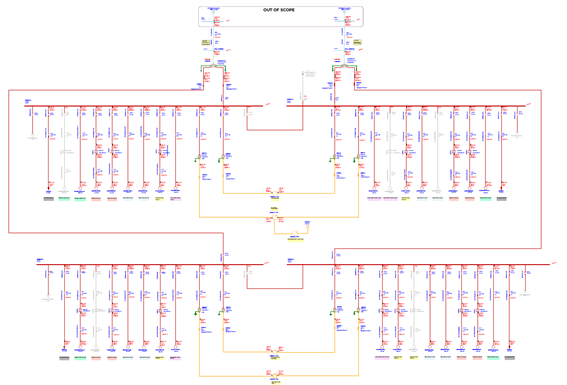- 6 February, 2024
- Francisco Gallego
- Comment: 0
- News

ELECTRICAL INSTALLATIONS IN WATER PROJECTS

In recent years, the MEP-Projects team has played a crucial role, leading the execution of significant water treatment projects.
The interconnection between water and energy is revealed not only as a critical necessity but also as a challenge. This complexity lies not only in the urgent need for water in energy production but also in the interrelation between energy, water, climate, and climate change.
In the industrial fabric, where the need for large water volumes and the generation of wastewater are common, there is a growing awareness. Due to environmental regulations, the industry recognizes the urgency of reducing water consumption and the reuse and recycling of water in its processes. In this context, the implementation of integrated measures in the process itself becomes crucial, and it is precisely at this point that MEP-Projects can contribute its acquired knowledge.
Water treatment involves carefully considering environmental aspects that require special attention but also offer opportunities for innovation and improvement. It is a process that demands a considerable amount of energy, fundamental to ensuring water quality. At MEP-Projects, we are committed to seeking proactive approaches to address all these aspects, thus encouraging more environmentally friendly practices in water treatment.
In the face of this reality, the planning of new facilities prioritizes energy optimization as a fundamental criterion. This leads to increasingly reduced and efficient power consumption. The modernization of existing facilities, with precise studies of load flows, harmonics, and reactive power consumption, becomes a key strategy for achieving short-term savings, areas where the MEP-Projects team demonstrates its technical expertise.
Our expert electrical engineering team works on water treatment projects, designing solutions that optimize energy consumption and reduce greenhouse gas emissions. In the sustainability framework, and returning to the previous theme, the incorporation of more efficient electrical installations aligns with environmental goals, reducing the carbon footprint associated with water treatment projects. This synergy between electrical engineering and water management reflects a shared commitment to a more sustainable and respectful future in our environment.
Desalination has become an essential technique, especially in regions with freshwater scarcity. This process involves removing salt and other contaminants from seawater or brackish water, making it suitable for drinking or industrial and agricultural use. Technologies like reverse osmosis have significantly advanced desalination efficiency. Although this process requires a high energy demand due to the osmotic pressure that must be overcome, there are currently devices like Energy Recovered Devices (ERD) that help significantly reduce this consumption.
At MEP Projects, we have extensive experience in the detailed engineering design of water treatment plants. We take pride in offering technical studies backed by highly qualified professionals, ensuring optimal solutions regarding electrical resources to guarantee the efficient operation of the plant.

Electrical Installation of a Desalination Plant simulated in Calculation Software
Made by Fabián García (Electrical Lead Engineer)
